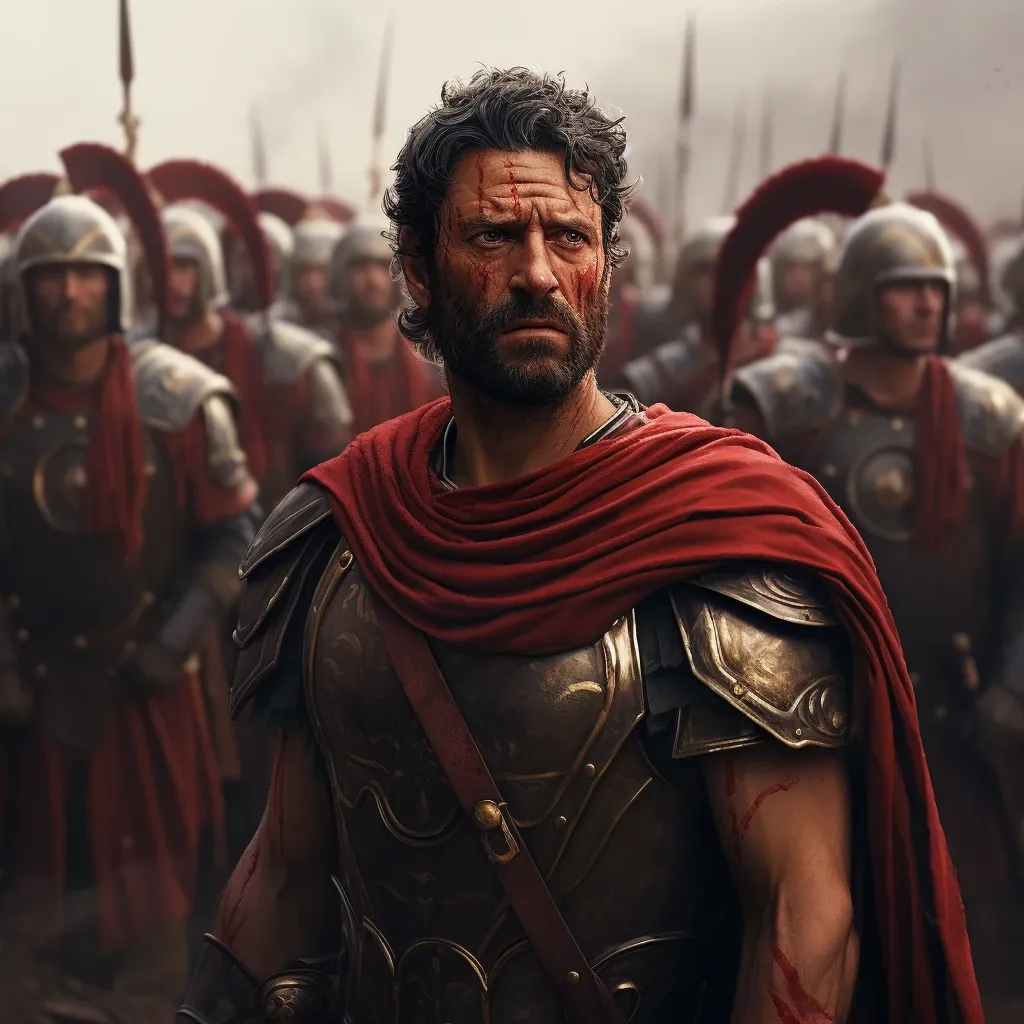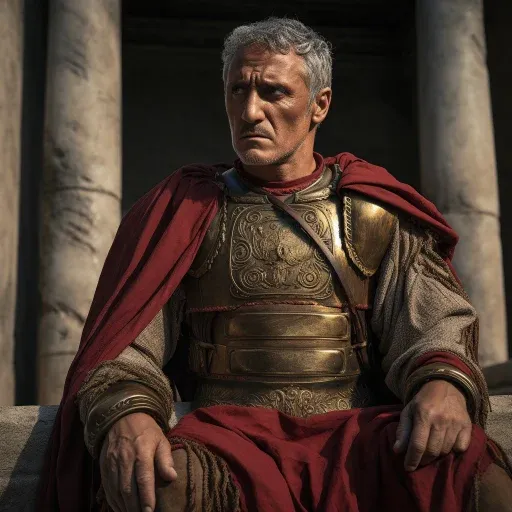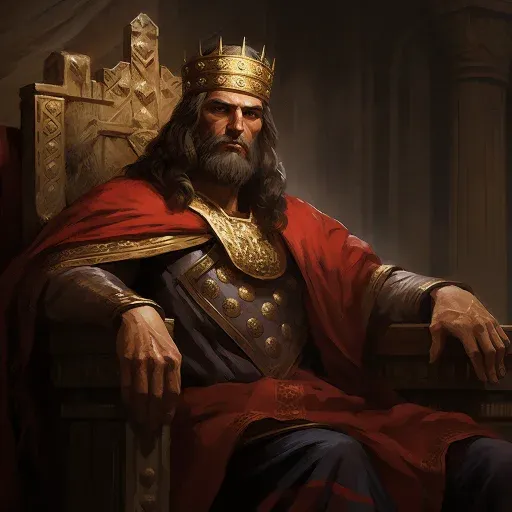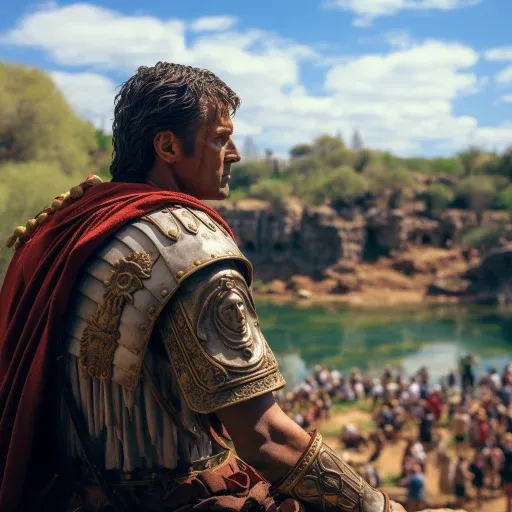BY JAMES BALDWIN
Hannibal, the Hero of Carthage
Famous Stories Retold: Story 27 of 30

Heading

Military Genius: Hannibal Barca, a Carthaginian general, is renowned for his tactical brilliance, especially during the Second Punic War against Rome.
Enduring Legacy: Despite eventually losing the war, Hannibal's strategies and campaigns have been studied and admired by military leaders throughout history.
A good book we like, we explorers. That is our best amusement, and our best time killer
- Roald Amundsen, Explorer
Hannibal: Carthage's Hero Against Rome
Immerse yourself in the captivating tale of Hannibal of Carthage, a true testament to an unyielding spirit that dared to challenge the mighty Rome. This saga of the ancient times is not merely a historical account, but a fascinating examination of courage, ambition, and the relentless pursuit of glory. Dive into the world of a warrior, whose audacious dreams and strategies forever altered the course of history. As we unfold the narrative, you'll uncover the profound lessons Hannibal's life and battles offer, and why his story remains compelling even today. Embark on this journey with us, and let the awe-inspiring chronicle of Hannibal enchant you.
The Inception: The Vow of a Young Warrior
The bustling city of Carthage was alive with anticipation and festivity as Hamilcar, the greatest general of the city, prepared to set sail for Spain. Amidst the throng of soldiers and citizens, stood a young boy of nine years, Hannibal, the son of the celebrated general. His young heart was already brimming with ambition, and he yearned to accompany his father to the battlefield.
Despite his father's refusal, Hannibal remained undeterred. In the hallowed halls of the temple of Baal, he took a solemn vow, a vow that would shape the course of his life and the history of Carthage. He pledged an undying enmity towards Rome and vowed to ceaselessly work towards its downfall. Thus, the seeds of a legendary warrior were sown.
A Hero in Making: Early Life of Hannibal
Hannibal spent his formative years honing his hatred for Rome and studying the art of war under the tutelage of his father, Hamilcar. Even as a young boy, he was known for his strength, bravery, and unwavering resolve. His early exposure to the military and his father's teachings prepared him for the great responsibilities that would soon fall upon his shoulders.
Following Hamilcar's death, Hannibal, at the mere age of twenty-four, was entrusted with leading the armies of Carthage. His youth did not deter him, rather, he saw it as an opportunity to finally fulfil his childhood vow. The stage was set for the young warrior to make his mark and prove his mettle.
Podcast
The Clash of Titans: The Outbreak of War
Hamilcar's prophecy of a great war between Rome and Carthage came to fruition. The two mighty nations were once again engaged in a fierce struggle for supremacy. Hannibal, now leading the Carthaginian armies, wasted no time in launching a preemptive strike before the Romans could rally their forces.
With a formidable force of men, horses, and elephants, he embarked on a daring march northward through Spain and into Gaul. The Romans, in their scramble to counter Hannibal's bold move, found themselves unable to halt his relentless progress. The young warrior's strategic genius and audacity were beginning to make their mark. The stage was set for one of the most daunting military expeditions in history - the crossing of the Alps.
The Impossible Journey: Crossing the Alps
Hannibal, now a seasoned military leader, found himself facing an obstacle that would have deterred lesser men - the mighty Alps. The Alps stood as an immense natural barrier, their icy crags and treacherous passes seemingly insurmountable. But Hannibal, driven by his vow to bring ruin to Rome, was undeterred. He rallied his troops and embarked on what was to become one of the most legendary military marches in history.
With an army numbering in the tens of thousands, including war elephants - a sight never before seen in Europe - Hannibal made his way through Spain, crossed the Rhone River in Gaul, and began his ascent of the Alps. Despite the challenges of the treacherous terrain, hostile mountain tribes, and the harsh Alpine weather, Hannibal's tenacity saw him through. He emerged from the Alps into Italy, ready to take on Rome on its own soil.

The Unyielding Struggle: Battles in Italy
Emerging from the harrowing journey through the Alps, Hannibal and his men were met with the formidable forces of Rome. Despite being in enemy territory and having endured unimaginable hardships, Hannibal's strategic genius came to the fore. He won several significant battles, including the Battle of Trebia and the Battle of Cannae, inflicting heavy casualties on the Roman forces.
However, Rome's resilience matched Hannibal's determination. Under the strategic leadership of Quintus Fabius Maximus, the Romans initiated a war of attrition, avoiding open battle and instead harassing Hannibal's forces, cutting off their supplies, and slowly weakening them. Despite his military prowess, Hannibal found himself unable to break Rome's resistance, marking a turning point in the war.
The Final Act: Downfall and Legacy of Hannibal
Hannibal's dream of conquering Rome was never realized. After fifteen years in Italy, he was recalled to Carthage to defend his homeland against a Roman counter-invasion. He was defeated at the Battle of Zama by Scipio Africanus, marking the end of the Second Punic War and Hannibal's military career.
While his dream of defeating Rome remained unfulfilled, Hannibal's legacy as a military strategist remains unparalleled. His audacious crossing of the Alps and his victories against Rome are studied in military academies to this day. His life is a testament to the power of a single-minded dedication to a cause, making him a true hero of Carthage.
Conclusion
As we conclude this exploration of Hannibal's life, we are left with a profound understanding of his unyielding spirit and willpower. Despite inevitable defeat, Hannibal's audacious ambition and strategic genius have etched his name into the annals of history as a formidable adversary to Rome. His relentless pursuit of glory, despite the odds, continues to inspire and captivate us even today. Hannibal's tale is a testament to the power of conviction and a reminder that even in defeat, true heroism lies in the courage to challenge the mightiest of foes.





